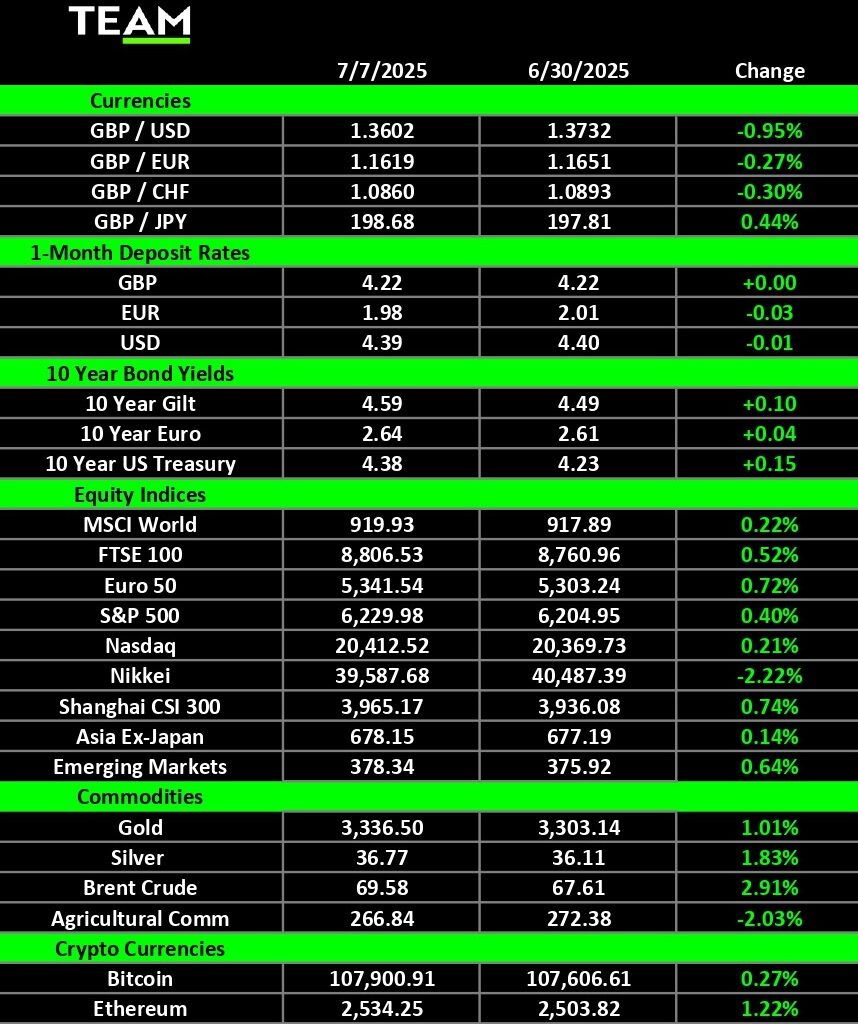Sponsored content
Lloyd Adams, of Team Asset Management, offers this week’s market review
WITH today’s deadline for potential US tariff increases suspended, markets will now focus on how trade talks will progress. Earlier this week, President Donald Trump sent letters to 14 countries, including Japan and South Korea, warning that higher levies could still take effect from 1 August. Only a few deals have so far been struck – namely with the UK, Vietnam and China, and talks with the EU and Japan remain difficult, although some compromises look inevitable.
President Trump also warned of a fresh 10% tariff on countries aligning with what he described as the “Anti-American policies of BRICS”, a group of developing nations meeting in Brazil. The BRICS leaders criticised unilateral tariffs and protectionism, saying such moves risk harming the global economy. Trump’s statement followed their joint declaration, widely seen as a direct critique of his trade stance. The BRICS bloc, which includes China, Russia, India and others, aims to challenge Western dominance in global finance and reduce reliance on the US dollar.
Despite a shorter trading week in the US due to the 4 July holiday – America’s Independence Day – there was plenty for investors to digest. The June US jobs report came in stronger than expected, with 147,000 new roles added – nearly half coming from state and local government jobs. The figures suggest the US economy remains steady, prompting investors to rein in expectations of an imminent interest rate cut. With inflation still being closely monitored, the Federal Reserve now looks more likely to wait until the autumn before making any move.
President Trump’s “Big Beautiful Bill” was signed into law on Friday. While the figures are eye-watering, the bill doesn’t introduce much in the way of fresh stimulus, it mainly avoids a sharp rise in taxes that would have taken place otherwise. It mainly benefits the wealthiest Americans, especially those earning over $700,000 a year. However, it does little for lower- and middle-income families, many of whom could be worse off due to significant cuts to social programmes such as Medicaid and food assistance.
Oil prices picked up slightly this week but remain well below their recent highs, having fallen sharply since late June. The Organisation of the Petroleum Exporting Countries agreed last weekend to increase the supply by 550,000 barrels per day, continuing the gradual trend seen in recent months. Hopes of renewed US-Iran nuclear talks are also influencing sentiment, putting some downward pressure on prices.
In metals, copper briefly pushed past a key price level before slipping back, weighed down by a stronger dollar and uncertainty over US trade policy. Gold, by contrast, remains in demand, with investors seeking safe havens and central banks continuing to build reserves.
Bitcoin briefly broke above the $110,000 mark this week before easing back, though institutional demand remains strong. Spot Bitcoin ETFs hit a new high, now holding a notable share of all coins in circulation.
It was a strong week for trading platform Robinhood, whose shares jumped nearly 14% after it announced plans to offer tokenised versions of over 200 US stocks and funds to European users. This marks another step forward in the wider trend of financial market tokenisation. Meanwhile, Tesla had a tougher time, falling 2.5% after reporting a sharp year-on-year drop in vehicle deliveries for the second quarter. Then, on Monday, Tesla’s share price fell a further 7% following Elon Musk’s announcement that he intends to form a new political party. Even so, investors remain hopeful about future growth, supported by new models, a potential recovery in China, and the long-awaited launch of the firm’s robotaxi.
Attention now turns to the second half of the year, with company earnings season due to begin shortly. Markets will also be watching closely for Chinese inflation data and the latest minutes from the US Federal Reserve.
Related
More from the JEP…
UK and World News
Entertainment News
